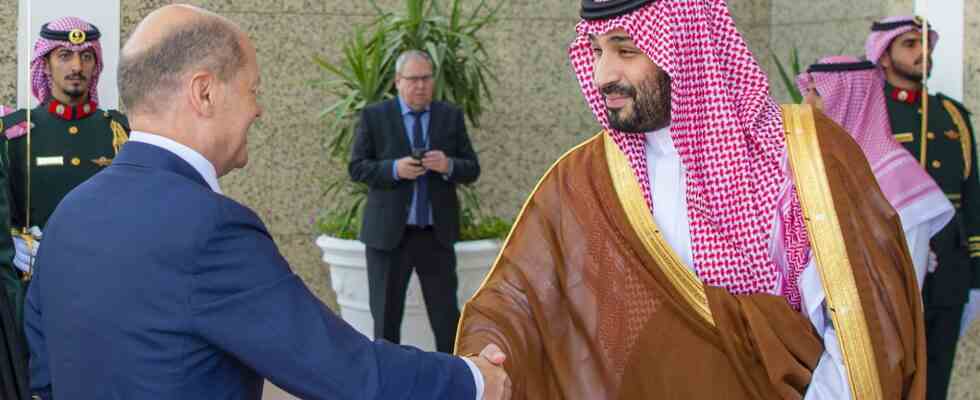Exclusive
Status: 06.10.2022 18:05
Germany approves arms shipments to Saudi Arabia, apparently in hopes of oil and hydrogen. It is a breach of the coalition agreement, which experts consider extremely questionable.
For six months there was hope in Yemen. The guns were silent for so long – after seven years of war. But these hopes have fizzled since Sunday: The ceasefire was canceled.
“It’s alarming,” says Abdulwasea Mohammed, who works for the aid organization Oxfam in Yemen. “It may mean that violence will spread across the country again. That millions of people will again become victims of airstrikes, rocket attacks and fighting on the ground.”
Saudi war crimes?
Years of war are already having dramatic consequences for the people of Yemen. The United Nations reports 380,000 dead, four million refugees and around 19 million people suffering from hunger. According to human rights organizations, this is also a direct consequence of the proxy war that a military alliance led by Saudi Arabia has been waging against rebels in Yemen for years. These rebels, in turn, are backed by Iran.
“Saudi Arabia and its coalition partners are bombing hospitals, kindergartens and schools. These are all war crimes,” criticizes Human Rights Watch’s Wenzel Michalski. The Saudi rulers have always rejected such allegations. According to human rights organizations, Saudi Arabia is one of the worst dictatorships in the world. Women, journalists and members of the opposition, for example, are oppressed and persecuted with all severity.
“There is a whole range of human rights violations in Saudi Arabia,” says Amnesty International’s Dana Ahmed. In fact, freedom of speech does not exist, the death penalty has been extended, and foreign workers are being exploited. “In one case that we documented, a woman was sentenced to 34 years in prison just for speaking out for women’s rights on Twitter,” Ahmed said.
German economic interests in Saudi Arabia
But now, in times of the energy crisis, Chancellor Olaf Scholz is apparently relying on good relations with the royal family in Riyadh. At the end of September, Scholz visited the Saudi Crown Prince Mohammed bin Salman. It was about German economic interests in times of the energy crisis: oil and hydrogen from Saudi Arabia. But apparently also about the interests of the European armaments industry.
Just a few days after the trip, the traffic light coalition announced for the first time since the beginning of its term that arms exports to Saudi Arabia would be approved. Specifically, it is about supplies for the equipment and armament of combat aircraft and ammunition.
“These are precisely the weapon systems with which Saudi Arabia has flown airstrikes in Yemen in the past, also repeatedly and systematically against civilian targets,” says Max Mutschler. He researches armament issues at the Bonn International Center for Conversion (BICC). He considers the German government’s decision to be highly problematic, especially in view of the fact that the ceasefire in Yemen is about to expire.
Contradiction to the coalition agreement
For years, the Greens in particular had campaigned vehemently against arms exports in crisis and war regions and for stricter rules. The current Foreign Minister Annalena Baerbock (Bündnis90/Die Grünen) wrote on Twitter in March 2019: “Saudi Arabia is taking part in the Yemen war and is trampling on human rights. The ban on arms exports to Saudi Arabia must continue to apply.”
The SPD, Greens and FDP also agreed in the coalition agreement not to issue export licenses for armaments to states as long as they can be shown to be directly involved in the Yemen war. The fact that exports are now being made is only an exception, argues the federal government. After all, Eurofighter and Tornado are European joint projects. According to the Federal Ministry of Economics, the “close collaboration and cooperation with our EU and NATO allies” is currently of great importance monitor-Request with.
However, today almost all major armaments projects are joint projects. As a result, the exception could increasingly become the rule, warns armaments expert Mutschler: “Ultimately, this undermines the German rules and laws, because people keep saying it’s European cooperation with partners, so we have to make an exception for that .”
Lambrecht wants to “get” the arms export rules
The traffic light coalition actually started with the promise to handle armaments exports more restrictively – also in the case of European joint projects. Nevertheless, deliveries can now be made, not only to Saudi Arabia, but also to Egypt and the United Arab Emirates. If Defense Minister Christine Lambrecht (SPD) has her way, the export rules for joint projects should be relaxed even further in the future.
With the German “reserved values” one places oneself above the European partners, “that’s why we have to get to the German export rules,” said Lambrecht in her keynote speech on September 12th.
For critics, this is a fatal signal. Heinrich Bedford-Strohm demands that Germany should not compromise on its human rights standards for arms exports, either in exchange for oil or hydrogen supplies, or as a concession to European partners and the armaments industry. For the evangelical regional bishop in Bavaria and chairman of the central committee of the World Council of Churches (WCC), it must be more about “leading a discussion that leads to human rights being the decisive yardstick for our arms export policy everywhere.”
You can see a TV report on this and other topics in the ARD political magazine Monitor at 9.45 p.m. on the first.

